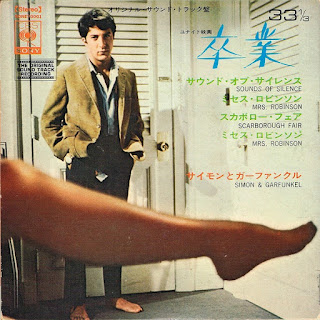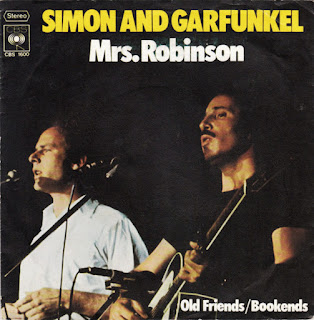SIMON & GARFUNKEL - MRS. ROBINSON
Estrena: 5 d'abril de 1968
Llistes: EUA: #1 (3 setmanes) Regne Unit: #4
"Mrs. Robinson" es presenta com una pista crucial de l'àlbum "Bookends" (1968) de Simon & Garfunkel. Sorprenentment, la seva concepció precedeix la seva inclusió a la pel·lícula "The Graduate" (1967), on inicialment només en van aparèixer fragments. Llançada com a single l’abril de 1968 per Columbia Records, la cançó va ser meticulosament produïda pel duo i Roy Halee. Escrita per Paul Simon, se'n van oferir fragments al director Mike Nichols després que rebutgés altres cançons proposades per a la pel·lícula. Tot i que la banda sonora de The Graduate va incloure versions abreviades de "Mrs. Robinson", la versió completa es va publicar a l'àlbum "Bookends". A més, va ser part de l'EP Mrs. Robinson publicat el 1968, juntament amb altres cançons de la pel·lícula, com ara "April Come She Will", "Scarborough Fair/Canticle" i "The Sound of Silence".
"Mrs. Robinson" va arribar al capdamunt de les llistes, suposant per a Simon & Garfunkel el seu segon número 1 al Billboard Hot 100. El seu èxit es va estendre globalment, arribant al top 10 en diversos països, incloent-hi el Regne Unit, Irlanda i Espanya. El 1969, va guanyar el Premi Grammy a la Millor Cançó de l'Any, cosa que va suposar ser la primera cançó de rock en aconseguir aquest reconeixement.
Simon va concebre inicialment la cançó com "Mrs. Roosevelt", amb el vers "Here's to you, Mrs. Roosevelt". Més tard la va canviar a "Mrs. Robinson" per a la seva inclusió a The Graduate. És probable que Eleanor Roosevelt hagués servit d'inspiració pels temes de la cançó. Roosevelt, coneguda per la seva defensa dels drets de les dones i els drets civils, sovint prioritzava ajudar als altres per damunt seu, especialment durant la Gran Depressió. Va jugar un paper significatiu en el panorama polític.
A "Mrs. Robinson", la frase "Where have you gone Joe DiMaggio?" ret homenatge a la llegenda del bèisbol, simbolitzant herois perduts. Tot i estar inicialment molest per la seva inclusió, DiMaggio més endavant en va estar d’acord pel seu nou significat cultural. Paul Simon, fan dels Yankees, va reflexionar sobre l'origen de la frase i el seu ressó amb la generació del baby boom. Malgrat la seva afinitat per Mickey Mantle, l’elecció de la lletra de Simon estava dictada per restriccions sil·làbiques. La mort de DiMaggio el 1999 va impulsar a Simon a escriure un emotiu homenatge al The New York Times, destacant l'impacte del sentiment nostàlgic de la cançó en els fans que van créixer idolatrant l'ícona del bèisbol.
Segons Art Garfunkel, "Mrs. Robinson" potser mai no s'hauria gravat si no fos pel director de The Graduate, Mike Nichols. Garfunkel va recordar que en aquell moment, la cançó era considerada "una frivolitat" i estava a punt de ser descartada. No obstant, quan Nichols en va escoltar una versió primerenca va reconèixer el seu potencial i va demanar a Paul Simon que l'adaptés per a la pel·lícula.
La incorporació de la frase "coo-coo-ca-choo" per part de Simon rendeix homenatge a una lletra de la cançó dels Beatles "I Am the Walrus".
SIMON & GARFUNKEL - MRS. ROBINSON
Released: April 5, 1968
Charted: US: #1 (3 weeks) UK: #4
"Mrs. Robinson" stands as a pivotal track from Simon & Garfunkel's album "Bookends" (1968). Surprisingly, its inception predates its feature in the film "The Graduate" (1967), where only fragments initially appeared. Released as a single on April 1968, by Columbia Records, the song was meticulously produced by the duo and Roy Halee. Penned by Paul Simon, portions of it were offered to director Mike Nichols, along with Art Garfunkel, after he rejected other proposed songs for the film. While The Graduate's soundtrack included abbreviated versions of "Mrs. Robinson," the full-length song found its home on the "Bookends" album. Moreover, it was part of the Mrs. Robinson EP released in 1968, alongside other memorable tracks from the movie, such as "April Come She Will," "Scarborough Fair/Canticle," and "The Sound of Silence."
"Mrs. Robinson" soared to the top of the charts, securing Simon & Garfunkel their second No. 1 hit on the Billboard Hot 100. Its success extended globally, reaching the top 10 in various countries including the United Kingdom, Ireland, and Spain. Remarkably, in 1969, it clinched the Grammy Award for Record of the Year, marking a historic milestone as the first rock song to achieve this accolade.
Simon initially conceived the song as "Mrs. Roosevelt," featuring the line "Here's to you, Mrs. Roosevelt." However, he later changed it to "Mrs. Robinson" for its inclusion in The Graduate. Eleanor Roosevelt likely served as an inspiration for the song's themes. Roosevelt, known for her advocacy for female and civil rights, often prioritized helping others over herself, particularly during the Great Depression. She played a significant role in the political landscape.
In "Mrs. Robinson," the line "Where have you gone Joe DiMaggio?" pays homage to the baseball legend, symbolizing lost heroes. Although initially miffed by his inclusion, DiMaggio later embraced his newfound cultural significance. Paul Simon, a Yankees fan, reflected on the line's origin and its resonance with the baby boomer generation. Despite his affinity for Mickey Mantle, Simon's songwriting choice was dictated by syllabic constraints. DiMaggio's 1999 passing stirred emotions, prompting Simon to pen a poignant tribute in The New York Times, highlighting the impact of the song's nostalgic sentiment on fans who grew up idolizing the baseball icon.
According to Art Garfunkel, "Mrs. Robinson" might never have been recorded if it weren't for The Graduate director Mike Nichols. Garfunkel recalled that at the time, the song was considered "a trifle" and was on the verge of being discarded. However, when Nichols heard an early version of the song, he recognized its potential and asked Paul Simon to adapt it for the film.
Simon's incorporation of the phrase "coo-coo-ca-choo" pays homage to a lyric from the Beatles' "I Am the Walrus."


























Cap comentari:
Publica un comentari a l'entrada